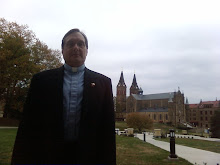
Jl 2:12-18
2 Cor 5:20-6:2
Mt 6:1-6, 16-18
When we speak of God’s love and forgiveness to someone who is questioning, we all too often use big examples. Does God really love Hitler? Does God really forgive Hitler? Does God really love Charles Manson? Does God really forgive him? Does God really love and forgive Stalin? We glibly answer yes, because it is so easy to do. It’s abstract, not real. How about a more reality based question. Does God really love and forgive me? Now it’s personal. We may say yes, knowing intellectually the truth, but in our hearts the answer is no. How can God love me? I am so bad, I am so unlovable, there is no way God loves and forgives me. I don’t deserve to be loved, I don’t deserve to be forgiven. Well you’re right, you don’t deserve to be loved and forgiven, but you are nonetheless. You are because our God’s love for us is unimaginable and completely without condition. God loves us, God calls us to repentance, yes, but more importantly God calls us to relationship, to share in God’s unconditional love. We are not beyond redemption, we are not beyond salvation, we cannot escape God’s love. God wants us, the only thing holding us back is us. We are afraid to turn to God, to accept the love that is ours for the taking. As we hear in the hymn Hosea, “ Long have I waited for your coming home to me and living deeply our new life.” What are we afraid of, changing, of things getting better? It’s so good now? Again what are we afraid of? As we enter this season of Lent let us work to overcome our fear, let us strive to understand there is nothing to fear. Turn to the Lord, for as Paul tells us, “Behold, now is a very acceptable time; behold, now is the day of salvation.”
Deacon John
Ash Wednesday
Feb. 25, 2009
2 Cor 5:20-6:2
Mt 6:1-6, 16-18
When we speak of God’s love and forgiveness to someone who is questioning, we all too often use big examples. Does God really love Hitler? Does God really forgive Hitler? Does God really love Charles Manson? Does God really forgive him? Does God really love and forgive Stalin? We glibly answer yes, because it is so easy to do. It’s abstract, not real. How about a more reality based question. Does God really love and forgive me? Now it’s personal. We may say yes, knowing intellectually the truth, but in our hearts the answer is no. How can God love me? I am so bad, I am so unlovable, there is no way God loves and forgives me. I don’t deserve to be loved, I don’t deserve to be forgiven. Well you’re right, you don’t deserve to be loved and forgiven, but you are nonetheless. You are because our God’s love for us is unimaginable and completely without condition. God loves us, God calls us to repentance, yes, but more importantly God calls us to relationship, to share in God’s unconditional love. We are not beyond redemption, we are not beyond salvation, we cannot escape God’s love. God wants us, the only thing holding us back is us. We are afraid to turn to God, to accept the love that is ours for the taking. As we hear in the hymn Hosea, “ Long have I waited for your coming home to me and living deeply our new life.” What are we afraid of, changing, of things getting better? It’s so good now? Again what are we afraid of? As we enter this season of Lent let us work to overcome our fear, let us strive to understand there is nothing to fear. Turn to the Lord, for as Paul tells us, “Behold, now is a very acceptable time; behold, now is the day of salvation.”
Deacon John
Ash Wednesday
Feb. 25, 2009








